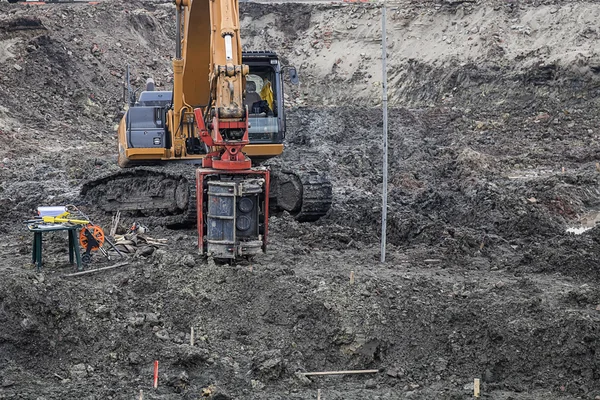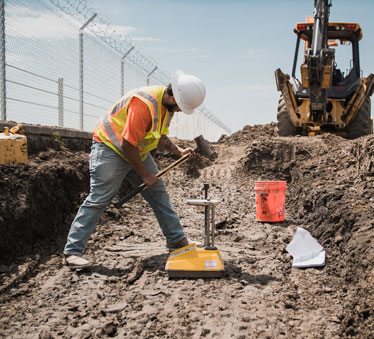The Evolution of Civil Consulting Engineers in the Modern Period
The Evolution of Civil Consulting Engineers in the Modern Period
Blog Article
A Comprehensive Summary of the Secret Duties of Geotechnical Engineers in Website Characterization and Ground Renovation Techniques for Engineering Solutions
Geotechnical engineers are indispensable to the successful implementation of engineering projects, tasked with the critical duties of website characterization and the application of ground enhancement techniques. Their job entails a complete evaluation of subsurface conditions, using various screening approaches to identify soil and rock residential properties.
Duty of Geotechnical Engineers
Geotechnical engineers play a pivotal role in the design and building and construction of facilities by assessing the behavior of dirt and rock beneath the surface - geotechnical industry. Their responsibilities include examining subsurface problems to inform style decisions that make certain architectural stability and security. By carrying out thorough evaluations of dirt residential or commercial properties, including shear compressibility, leaks in the structure, and strength, geotechnical engineers give essential information that influences the selection of ideal building and construction materials and methods
Along with examining soil technicians, geotechnical designers are tasked with determining possible hazards such as landslides, sinkholes, and ground negotiations. Their competence assists minimize risks linked with these geotechnical phenomena, thereby securing both the environment and public safety. They likewise collaborate very closely with other engineering disciplines, making sure that geotechnical factors to consider are incorporated right into overall project style.
Additionally, geotechnical designers participate in the examination of existing frameworks, offering suggestions for retrofitting and repair work when required. Their thorough understanding of soil-structure communication is necessary for the growth of lasting infrastructure options. Generally, the role of geotechnical engineers is integral to the effective realization of building projects, guaranteeing they are risk-free, long lasting, and compliant with governing requirements.

Website Characterization Procedures
Effective site characterization procedures are essential for understanding the subsurface problems that affect project design and implementation. Geotechnical engineers use an organized strategy to collect, assess, and analyze information relating to rock, dirt, and groundwater features. This process begins with a complete evaluation of existing literature and historic website data, supplying understandings into previous website conditions and possible challenges.

Data evaluation complies with fieldwork, where designers utilize geostatistical approaches to analyze findings and develop geological versions. Through persistent site characterization, geotechnical engineers lay the groundwork for effective job implementation, optimizing and decreasing unanticipated issues source allowance.
Soil and Rock Screening Techniques
While recognizing subsurface conditions is critical, the option of ideal soil and rock testing techniques is just as important for precise evaluation and design. Geotechnical engineers utilize a variety of testing techniques to examine the physical and mechanical properties of soil and rock materials.
Research laboratory examinations, such as Atterberg restrictions, grain size evaluation, and unconfined compressive toughness examinations, offer necessary data on soil habits under different dampness conditions and loading situations. These tests help figure out dirt category and forecast settlement or shear strength features crucial for structure style.
In-situ testing approaches, consisting of Criterion Infiltration Examinations (SPT), Cone Infiltration Tests (CPT), and stress meter examinations, enable engineers to gather data straight from the ground. These approaches offer useful insights right into the dirt's density, uniformity, and stratification without the requirement for extensive tasting.
Rock testing typically entails core tasting and laboratory analysis to assess buildings like uniaxial compressive toughness and rock quality designation (RQD) Together, these soil and rock testing methods make it possible for geotechnical engineers to make enlightened choices concerning site-specific difficulties, making certain the safety and security and stability of design options.
Ground Improvement Methods
Ground enhancement strategies are necessary for boosting the design residential or commercial properties of soil, thus boosting its load-bearing ability and decreasing negotiation. These methods are crucial in dealing with obstacles offered by bothersome or weak dirts, which can substantially impact the stability and longevity of structures.
Different ground improvement methods are utilized, consisting of compaction, grouting, and dirt stabilization. Grouting, on the other hand, involves infusing a liquid material into the ground to fill up voids and enhance soil communication.
Soil stablizing encompasses a range of approaches, from chemical ingredients to mechanical treatments, intended at boosting the dirt's resistance to disintegration and deformation. Techniques such as lime stablizing or concrete blending modify the properties of the soil at a fragment degree, boosting its general performance.
Value of Geotechnical Evaluations
Geotechnical assessments play a crucial role in the preparation and design of design projects, as they supply vital info regarding the subsurface conditions. Understanding dirt homes, rock developments, groundwater levels, and prospective geohazards is essential for guaranteeing the stability and safety and security of structures. These evaluations make it possible for engineers to make enlightened decisions relating to site selection, design criteria, and building techniques.
The significance of geotechnical analyses prolongs past preliminary project stages; they are important in danger management and price efficiency. By recognizing potential problems early, such as dirt settlement, incline instability, or extreme groundwater, engineers can devise ideal mitigation strategies, minimizing the chance of structural failures and pricey hold-ups. Furthermore, these analyses sustain conformity with governing requirements and improve the sustainability of design methods.

Verdict
In conclusion, geotechnical designers are essential to making certain the safety and stability of design projects with extensive site characterization and ground enhancement techniques. geotechnical industry. Their methodical method to analyzing subsurface problems, combined with their referrals for reliable ground adjustment, significantly improves dirt residential or commercial properties and load-bearing capability. The proficiency of geotechnical engineers not only facilitates enlightened job preparation however likewise makes certain compliance with policies and cultivates efficient communication amongst stakeholders, eventually adding to great site successful design end results
Geotechnical designers here are the findings play a pivotal function in the style and building of framework by examining the actions of dirt and rock beneath the surface area. By performing in-depth evaluations of soil buildings, consisting of shear permeability, compressibility, and stamina, geotechnical engineers give important information that influences the choice of suitable building products and methods.
In enhancement to examining soil auto mechanics, geotechnical engineers are charged with identifying potential threats such as landslides, sinkholes, and ground negotiations. Geotechnical engineers employ a systematic approach official site to collect, examine, and interpret information relating to groundwater, rock, and soil qualities. By identifying potential issues early, such as dirt settlement, incline instability, or too much groundwater, designers can devise appropriate reduction strategies, reducing the chance of expensive delays and structural failings.
Report this page